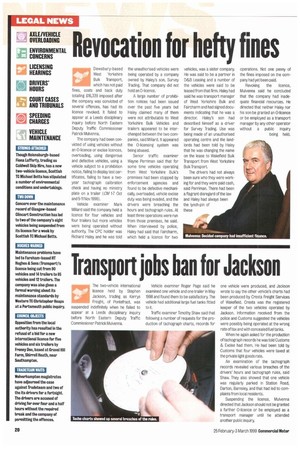Revocation for hefty fines
Page 22

If you've noticed an error in this article please click here to report it so we can fix it.
Dewsburybased
kodiiWest Yorkshire kodiiWest Yorkshire ..., Bulk Transport, which has not paid fines, costs and back duty totalling £16,339 imposed after the company was convicted of several offences, has had its licence revoked. It failed to appear at a Leeds disciplinary inquiry before North Eastern Deputy Traffic Commissioner Patrick Mulvenna.
The company had been convicted of using vehicles without an 0-licence or excise licences, overloading, using dangerous and defective vehicles, using a vehicle subject to a prohibition nonce, failing to display test certificates, failing to have a twoyear tachograph calibration check and having no ministry plate on a trailer (CM 1-7 Oct and 5-11Nov199B).
Vehicle examiner Mark Millard said the company held a licence for four vehicles and four trailers but more vehicles were being operated without authority. The CPC holder was Richard Haley and he was told the unauthorised vehicles were being operated by a company owned by Haley's son, Survey Trading. That company did not hold an 0-licence.
A large number of prohibition notices had been issued over the past five years but Haley claimed many of them were not attributable to West Yorkshire Bulk Vehicles and trailers appeared to be interchanged between the two companies, said Millard. It appeared the 0-licensing system was being abused.
Senior traffic examiner Wayne Perriman said that for some time vehicles operating from West Yorkshire Bulk's premises had been stopped by enforcement agencies and found to be defective mechanically, overloaded, vehicle excise duty was being evaded, and the drivers were breaching the hours and tachograph rules. At least three operations were run from those premises, he said. When interviewed by police, Haley had said that Faircharm, which held a licence for two vehicles, was a sister company. He was said to be a partner in D&B Leasing and a number of the vehicles were said to be leased from that firm. Haley had said he was transport manager of West Yorkshire Bulk and Faircharm and had signed documents indicating that he was a director. Haley's son had described himself as a driver for Survey Trading. Use was being made of an unauthorised operating centre and the landlords had been told by Haley that he was changing the name on the lease to Wakefield Bulk Transport from West Yorkshire Bulk Transport.
The drivers had not always been sure who they were working for and they were paid cash, said Perriman. There had been a flagrant disregard of the law and Haley had always been the lynch-pin of these operations. Not one penny of the fines imposed on the company had yet been paid.
Revoking the licence, Mulvenna said he concluded that the company had inadequate financial resources. He directed that neither Haley nor his son be granted an 0-licence or be employed as a transport manager by any other operator without a public inquiry being held.
















































































































